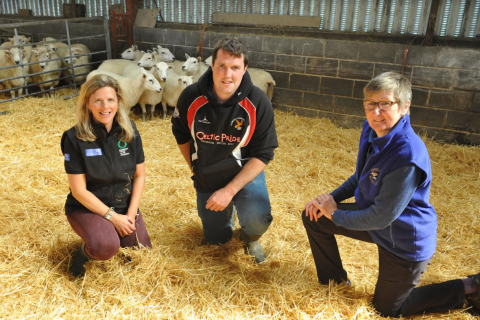19 September 2019
Addressing a cobalt deficiency has lifted daily liveweight gains in lambs at a Carmarthenshire sheep farm.
At Aberbranddu, a Farming Connect Demonstration Farm near Pumpsaint, trace element tests on lambs born this spring confirmed a cobalt deficiency.
Working alongside Farming Connect, farmer Irwel Jones trialled two methods of supplementation – a cobalt bolus and an injectable cobalt product.
Both treatments produced the same results, lifting lamb growth rates, but there was no significant difference between the two treatment methods.
Mr Jones, who recently hosted his final open day at a Demonstration Farmer, said the trace element testing had been a useful exercise and, with the knowledge he had gained from that, all lambs would in future be supplemented at eight weeks.
“Testing has flagged up a cobalt deficiency here on the farm so supplementing will be part of our protocols going forward,’’ said Mr Jones, who runs a flock of 940 Tregaron-type Welsh ewes.
Cobalt is essential for producing the vitamin B12 which is required by rumen micro-organisms to drive feed conversion efficiency and development.
If farmers suspect they may have a problem, testing a sample of lambs should be a priority, recommended Brecon-based vet Kate Hovers.
Mrs Hovers, a speaker at the open day, said supplementing would always be more effective when it was done as a preventative measure rather than a treatment when lambs were already performing poorly.
Testing is important because it could rule out the need for supplementation, she added. “Farmers could be wasting money on supplementing trace elements if flocks have adequate levels of trace elements.’’
The project was one of a number Mr Jones had embarked on during Aberbranddu’s four-year period as a Farming Connect Demonstration Farm.
He said these had given him the confidence to make changes that could improve his business going forward.
Mr Jones had previously identified weaknesses in his business but was unsure what approaches to take to resolve these, including a need to improve grass utilisation, growth and quality.
He achieved this by converting from set stocking to rotational grazing, guided by rotational grazing consultant James Daniels through Farming Connect.
Mr Jones said he was now growing more grass throughout the season, and had reduced his reliance on purchased feed while increasing the stocking rate on his 263-hectare hill farm.
He had also investigated water use by his flock. Limited water supply to some fields can be a barrier to rotational grazing – AHDB figures recommend a daily water supply of 3.3-7.5litres per ewe.
But research at Aberbranddu, which measured water consumption over a period of time, recorded much lower intakes, possibly reflecting regional variations dictated by different weather conditions.
Sarah Hughes, Farming Connect Red Meat Technical Officer (South West Wales), said these results, which would be the subject of further research before any firm conclusions could be drawn, could have implications for how land is grazed.
Mrs Hughes said the Farming Connect work at Aberbranddu over the last four years had demonstrated that there are cumulative gains from attention to detail in multiple areas.
“Irwel has embarked on a variety of projects focusing on very specific issues in his sheep enterprise and the combination of the gains made in these areas resulted in a significant gain to the business overall,’’ she said.
Farming Connect, which is delivered by Menter a Busnes and Lantra, is funded by the European Agricultural Fund for Rural Development and Welsh Government.

